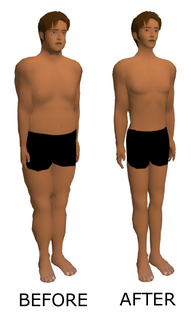
The fat acceptance movement is a social movement seeking to change anti-fat bias in social attitudes by raising awareness among the general public about the obstacles faced by fat people. Areas of contention include the aesthetic, legal, and medical approaches to people whose bodies are fatter than the social norm.
In a support group, members provide each other with various types of help, usually nonprofessional and nonmaterial, for a particular shared, usually burdensome, characteristic. Members with the same issues can come together for sharing coping strategies, to feel more empowered and for a sense of community. The help may take the form of providing and evaluating relevant information, relating personal experiences, listening to and accepting others' experiences, providing sympathetic understanding and establishing social networks. A support group may also work to inform the public or engage in advocacy.
Pro-ana refers to the promotion of behaviors related to the eating disorder anorexia nervosa. It is often referred to simply as ana. The lesser-used term pro-mia refers likewise to bulimia nervosa and is sometimes used interchangeably with pro-ana.

Weight loss, in the context of medicine, health, or physical fitness, refers to a reduction of the total body mass, by a mean loss of fluid, body fat, or lean mass. Weight loss can either occur unintentionally because of malnourishment or an underlying disease, or from a conscious effort to improve an actual or perceived overweight or obese state. "Unexplained" weight loss that is not caused by reduction in calorific intake or exercise is called cachexia and may be a symptom of a serious medical condition. Intentional weight loss is commonly referred to as slimming.

WW International, Inc., formerly Weight Watchers International, Inc., is a global company headquartered in the U.S. that offers various products and services, including weight loss and maintenance, fitness, and mindset such as the Weight Watchers comprehensive diet program. Founded in 1963 by Queens, New York City homemaker Jean Nidetch, WW's program has three options as of 2019: online via its mobile app and website, coaching online or by phone, or in-person meetings.

Slimming World is a UK-based weight loss organisation that caters for men and women of all ages. It was founded in Derbyshire in 1969 by Margaret Miles-Bramwell, who remains its chairman.

Web 2.0 refers to websites that emphasize user-generated content, ease of use, participatory culture and interoperability for end users.
Peer support occurs when people provide knowledge, experience, emotional, social or practical help to each other. It commonly refers to an initiative consisting of trained supporters, and can take a number of forms such as peer mentoring, reflective listening, or counseling. Peer support is also used to refer to initiatives where colleagues, members of self-help organizations and others meet, in person or online, as equals to give each other connection and support on a reciprocal basis.

ReachOut.com is an internet service for young people that provides information, support and resources about mental health issues and enable them to develop resilience, increase coping skills, and facilitate help-seeking behaviour. The site contains information about issues affecting young people in the form of fact sheets, stories, podcasts and online forums.
Social media is interactive digitally-mediated technologies that facilitate the creation or sharing/exchange of information, ideas, career interests, and other forms of expression via virtual communities and networks. While challenges to the definition of social media arise due to the broad variety of stand-alone and built-in social-media services currently available, there are some common features:
- Social media are interactive Web 2.0 Internet-based applications.
- User-generated content—such as text posts or comments, digital photos or videos, and data generated through all online interactions—is the lifeblood of social media.
- Users create service-specific profiles for the website or app that are designed and maintained by the social-media organization.
- Social media facilitate the development of online social networks by connecting a user's profile with those of other individuals or groups.

Fat feminism, often associated with "body-positivity", is a social movement that incorporates feminist themes of equality, social justice, and cultural analysis based on the weight of a woman or a non-binary feminine person. This branch of feminism intersects misogyny and sexism with anti-fat bias. Fat feminists advocate body-positive acceptance for all bodies, regardless of their weight, as well as eliminating biases experienced directly or indirectly by fat people. Fat feminists originated during third-wave feminism and is aligned with the fat acceptance movement. A significant portion of body positivity in the third-wave focused on embracing and reclaiming femininity, such as wearing makeup and high heels, even though the second-wave fought against these things. Contemporary fat feminism works to dismantle oppressive power structures which disproportionately affect fat, queer, non-white, disabled, and other non-hegemonic bodies. It covers a wide range of topics such as diet culture, fat-phobia, representation in media, ableism, and employment discrimination.
Ian K. Smith, M.D. is an American physician, author and television host best known for hosting The Doctors. In 2007, he launched the 50 Million Pound Challenge, a national weight loss initiative sponsored by CVS Pharmacy and State Farm.
Nutrisystem is a commercial provider of weight loss products and services headquartered in Fort Washington, Pennsylvania. Nutrisystem's initial product in 1972 was a liquid protein diet, but the company changed its offering after Slim-Fast came to prominence in that market. The company originally offered weight loss counseling and products in brick and mortar centers, but in 1999, Nutrisystem moved to a direct-to-consumer business model, selling its products and programs on the Internet and by telephone.
The online service imeem was a social media website where users interacted with each other by streaming, uploading and sharing music and music videos. It operated from 2003 until 2009 when it was shut down after being acquired by MySpace.
Bay Area Sex Worker Advocacy Network (BAYSWAN), is a non-profit organization in the San Francisco Bay Area which works to improve working conditions, increase benefits, and eliminate discrimination on behalf of individuals working within both legal and criminalized adult entertainment industries. The organization provides advice and information to social service, policy reformers, media outlets, politicians, including the San Francisco Task Force on Prostitution and Commission on the Status of Women (COSW), and law enforcement agencies dealing with sex workers.
SparkPeople is an American private company which develops and maintains several healthy living websites and mobile apps.
Wellspring Camps were a group of children's health and wellness camps located in La Jolla, California and Melbourne, Florida. The camp focused on changing behavior and eating patterns in order to create long-term healthy lifestyles for participants. Due to "economic feasibility" Wellspring Camps is not currently operating.
The South Beach Diet is a popular fad diet developed by Arthur Agatston and promoted in a best-selling 2003 book. It emphasizes eating food with a low glycemic index, and categorizes carbohydrates and fats as "good" or "bad". Like other fad diets, it may have elements which are generally recognized as sensible, but it promises benefits not backed by supporting evidence or sound science.
HealthyWage is a for-profit health and wellness company that provides weight loss and fitness challenges with cash prizes. The company is noted for pushing public discussion on health incentive issues, and for launching programs that use various combinations of cash prizes, financial commitment, social motivation and positive peer pressure to achieve weight loss and fitness results at the corporate and consumer levels.
Health blogs are niche blogs that cover health topics, events and/or related content of the health industry and the general community.






